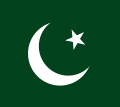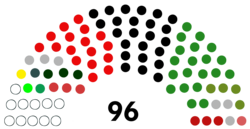Council Muslim League کونسل مسلم لیگ | |
|---|---|
 | |
| Leader | Khawaja Nazimuddin [1] |
| Other Historical Leaders |
|
| Founded | 1962 |
| Dissolved | 1973 |
| Split from | PML |
| Merged into | PML(F) |
| Ideology | Conservatism Anti-Ayub Khan |
 |
|---|
The Council Muslim League was a faction of the Pakistan Muslim League that divided from the Convention Muslim League that was supportive of the military regime of the President of Pakistan Gen. Ayub Khan. [2] Sardar Muhammad Zafarullah, Mian Mumtaz Daultana, Sardar Shauket Hyat-Khan, Chaudhry Muhammad Husain Chattha, Khawaja Muhammad Safdar and Chaudhry Zahoor Elahi were prominent leaders of the Council Muslim League.[ citation needed ]

